BTEC HND Unit 4 Management and Operations Report: TESCO Case Study
VerifiedAdded on 2023/01/19
|16
|5366
|88
Report
AI Summary
This report delves into the core concepts of management and operations, focusing on the differences and similarities between leaders and managers, and how these roles apply in various situational contexts, using TESCO as a case study. It explores leadership theories, including situational, systems, and contingency leadership, while evaluating their strengths and weaknesses. The report also analyzes key approaches to operations management, emphasizing its value in achieving organizational objectives. Furthermore, it evaluates the factors influencing operational management and decision-making, including the impact on the wider community and environment. The report includes an introduction outlining the scope and methodology, followed by a discussion of leadership vs. management, leadership theories, and operational management. The report concludes with an assessment of the business environment, considering the factors that affect operational management, decision-making, and the wider community. This report provides a comprehensive analysis of leadership and management, emphasizing practical applications and strategic insights.
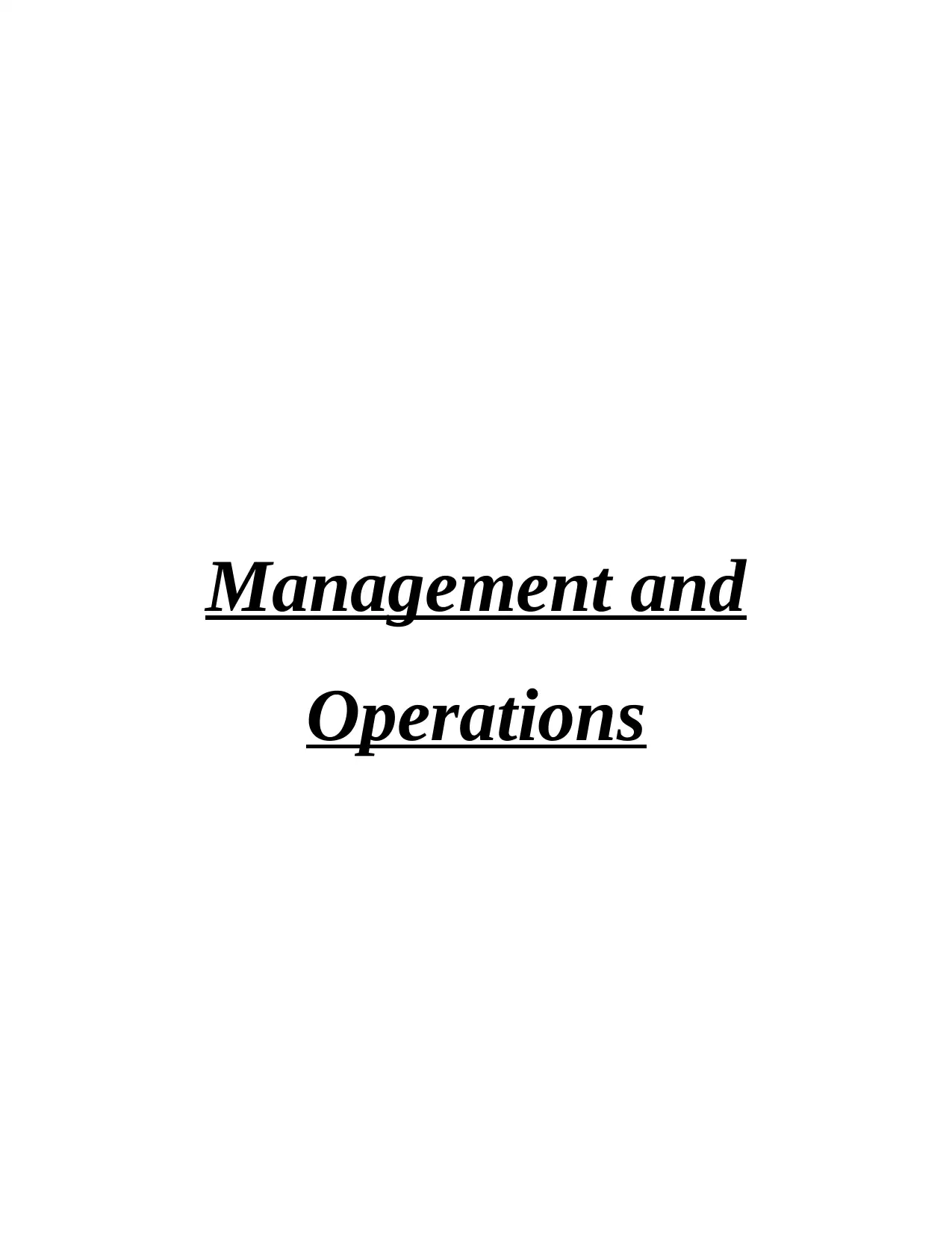
Management and
Operations
Operations
Paraphrase This Document
Need a fresh take? Get an instant paraphrase of this document with our AI Paraphraser
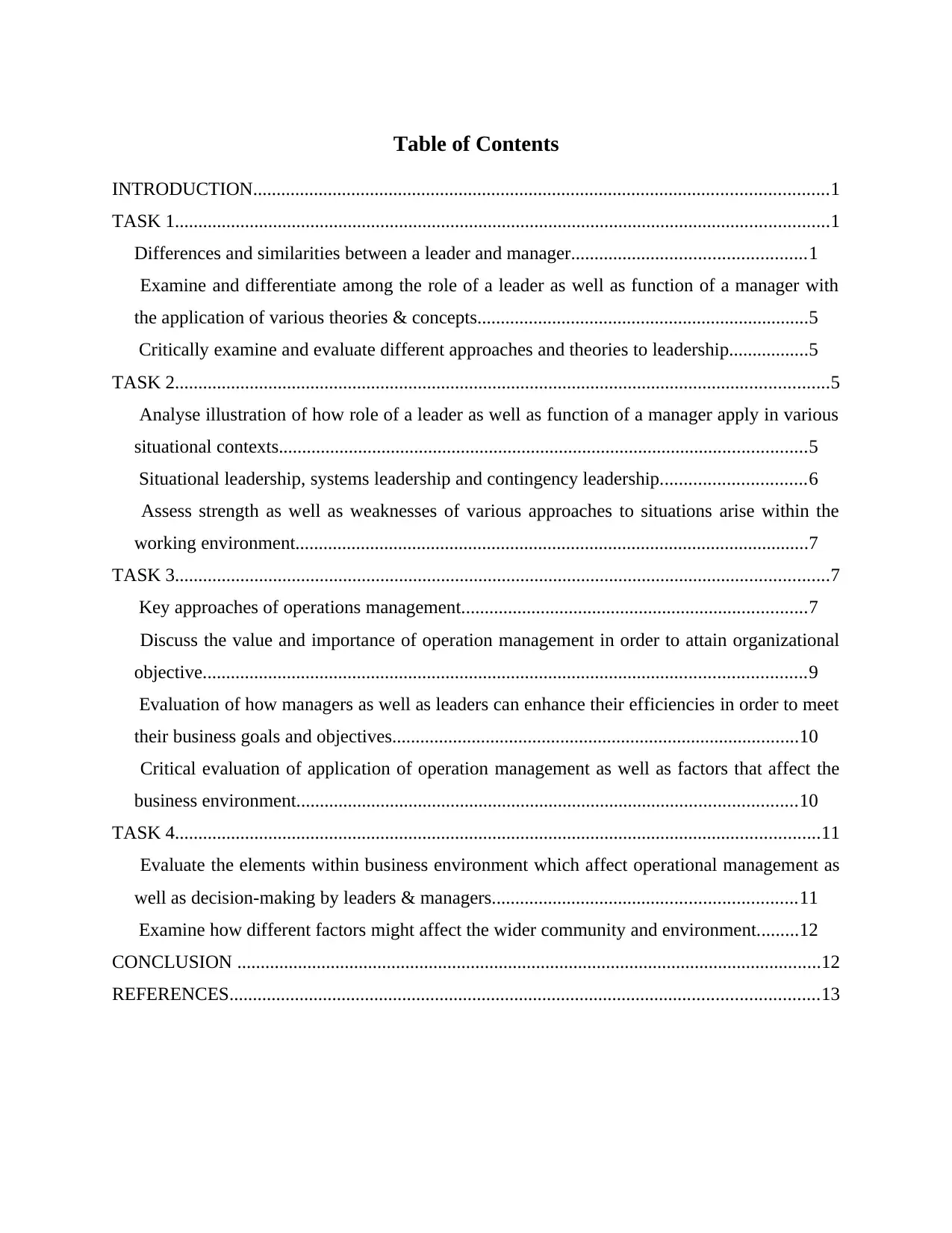
Table of Contents
INTRODUCTION...........................................................................................................................1
TASK 1............................................................................................................................................1
Differences and similarities between a leader and manager..................................................1
Examine and differentiate among the role of a leader as well as function of a manager with
the application of various theories & concepts.......................................................................5
Critically examine and evaluate different approaches and theories to leadership.................5
TASK 2............................................................................................................................................5
Analyse illustration of how role of a leader as well as function of a manager apply in various
situational contexts.................................................................................................................5
Situational leadership, systems leadership and contingency leadership...............................6
Assess strength as well as weaknesses of various approaches to situations arise within the
working environment..............................................................................................................7
TASK 3............................................................................................................................................7
Key approaches of operations management..........................................................................7
Discuss the value and importance of operation management in order to attain organizational
objective.................................................................................................................................9
Evaluation of how managers as well as leaders can enhance their efficiencies in order to meet
their business goals and objectives.......................................................................................10
Critical evaluation of application of operation management as well as factors that affect the
business environment...........................................................................................................10
TASK 4..........................................................................................................................................11
Evaluate the elements within business environment which affect operational management as
well as decision-making by leaders & managers.................................................................11
Examine how different factors might affect the wider community and environment.........12
CONCLUSION .............................................................................................................................12
REFERENCES..............................................................................................................................13
INTRODUCTION...........................................................................................................................1
TASK 1............................................................................................................................................1
Differences and similarities between a leader and manager..................................................1
Examine and differentiate among the role of a leader as well as function of a manager with
the application of various theories & concepts.......................................................................5
Critically examine and evaluate different approaches and theories to leadership.................5
TASK 2............................................................................................................................................5
Analyse illustration of how role of a leader as well as function of a manager apply in various
situational contexts.................................................................................................................5
Situational leadership, systems leadership and contingency leadership...............................6
Assess strength as well as weaknesses of various approaches to situations arise within the
working environment..............................................................................................................7
TASK 3............................................................................................................................................7
Key approaches of operations management..........................................................................7
Discuss the value and importance of operation management in order to attain organizational
objective.................................................................................................................................9
Evaluation of how managers as well as leaders can enhance their efficiencies in order to meet
their business goals and objectives.......................................................................................10
Critical evaluation of application of operation management as well as factors that affect the
business environment...........................................................................................................10
TASK 4..........................................................................................................................................11
Evaluate the elements within business environment which affect operational management as
well as decision-making by leaders & managers.................................................................11
Examine how different factors might affect the wider community and environment.........12
CONCLUSION .............................................................................................................................12
REFERENCES..............................................................................................................................13
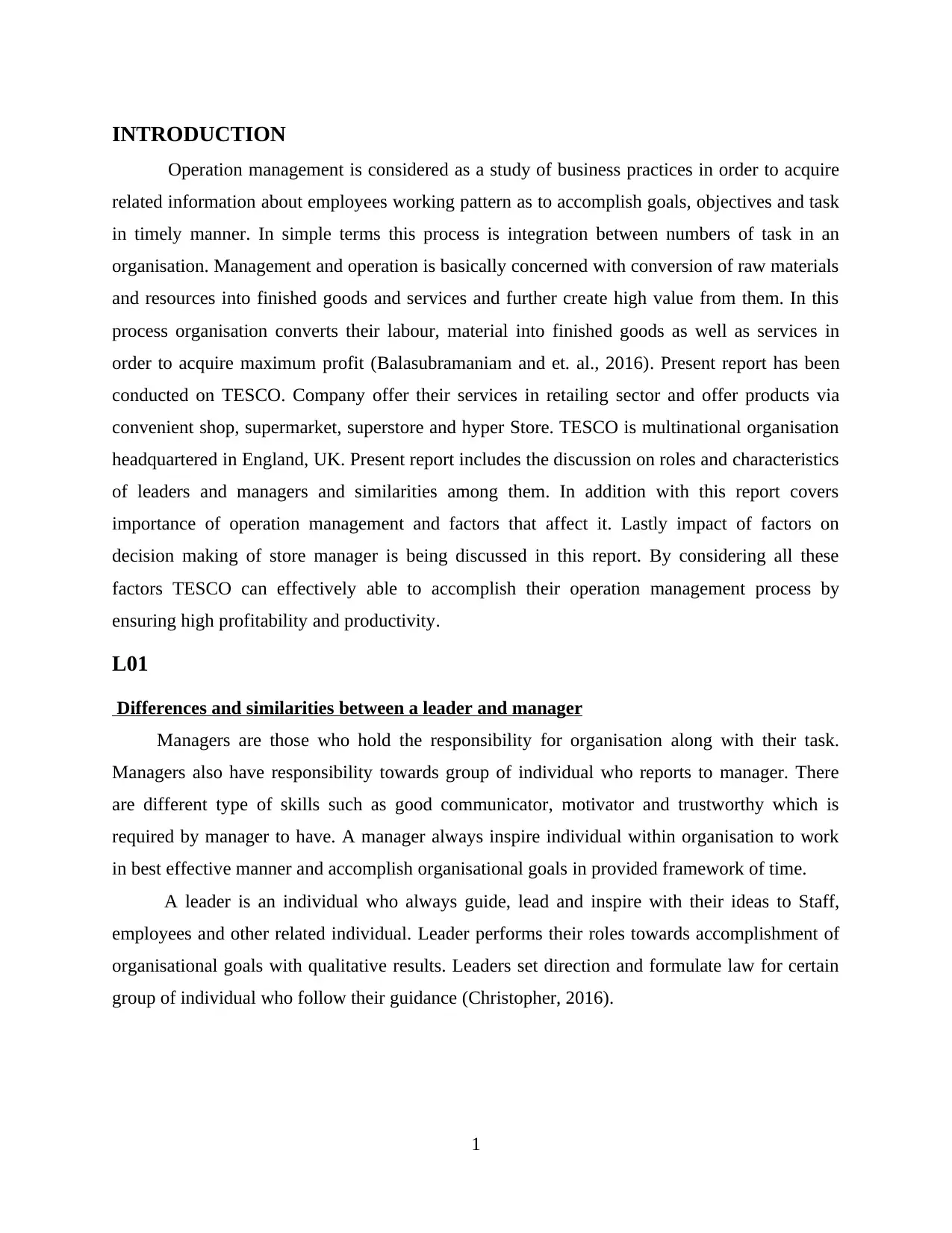
INTRODUCTION
Operation management is considered as a study of business practices in order to acquire
related information about employees working pattern as to accomplish goals, objectives and task
in timely manner. In simple terms this process is integration between numbers of task in an
organisation. Management and operation is basically concerned with conversion of raw materials
and resources into finished goods and services and further create high value from them. In this
process organisation converts their labour, material into finished goods as well as services in
order to acquire maximum profit (Balasubramaniam and et. al., 2016). Present report has been
conducted on TESCO. Company offer their services in retailing sector and offer products via
convenient shop, supermarket, superstore and hyper Store. TESCO is multinational organisation
headquartered in England, UK. Present report includes the discussion on roles and characteristics
of leaders and managers and similarities among them. In addition with this report covers
importance of operation management and factors that affect it. Lastly impact of factors on
decision making of store manager is being discussed in this report. By considering all these
factors TESCO can effectively able to accomplish their operation management process by
ensuring high profitability and productivity.
L01
Differences and similarities between a leader and manager
Managers are those who hold the responsibility for organisation along with their task.
Managers also have responsibility towards group of individual who reports to manager. There
are different type of skills such as good communicator, motivator and trustworthy which is
required by manager to have. A manager always inspire individual within organisation to work
in best effective manner and accomplish organisational goals in provided framework of time.
A leader is an individual who always guide, lead and inspire with their ideas to Staff,
employees and other related individual. Leader performs their roles towards accomplishment of
organisational goals with qualitative results. Leaders set direction and formulate law for certain
group of individual who follow their guidance (Christopher, 2016).
1
Operation management is considered as a study of business practices in order to acquire
related information about employees working pattern as to accomplish goals, objectives and task
in timely manner. In simple terms this process is integration between numbers of task in an
organisation. Management and operation is basically concerned with conversion of raw materials
and resources into finished goods and services and further create high value from them. In this
process organisation converts their labour, material into finished goods as well as services in
order to acquire maximum profit (Balasubramaniam and et. al., 2016). Present report has been
conducted on TESCO. Company offer their services in retailing sector and offer products via
convenient shop, supermarket, superstore and hyper Store. TESCO is multinational organisation
headquartered in England, UK. Present report includes the discussion on roles and characteristics
of leaders and managers and similarities among them. In addition with this report covers
importance of operation management and factors that affect it. Lastly impact of factors on
decision making of store manager is being discussed in this report. By considering all these
factors TESCO can effectively able to accomplish their operation management process by
ensuring high profitability and productivity.
L01
Differences and similarities between a leader and manager
Managers are those who hold the responsibility for organisation along with their task.
Managers also have responsibility towards group of individual who reports to manager. There
are different type of skills such as good communicator, motivator and trustworthy which is
required by manager to have. A manager always inspire individual within organisation to work
in best effective manner and accomplish organisational goals in provided framework of time.
A leader is an individual who always guide, lead and inspire with their ideas to Staff,
employees and other related individual. Leader performs their roles towards accomplishment of
organisational goals with qualitative results. Leaders set direction and formulate law for certain
group of individual who follow their guidance (Christopher, 2016).
1
⊘ This is a preview!⊘
Do you want full access?
Subscribe today to unlock all pages.

Trusted by 1+ million students worldwide
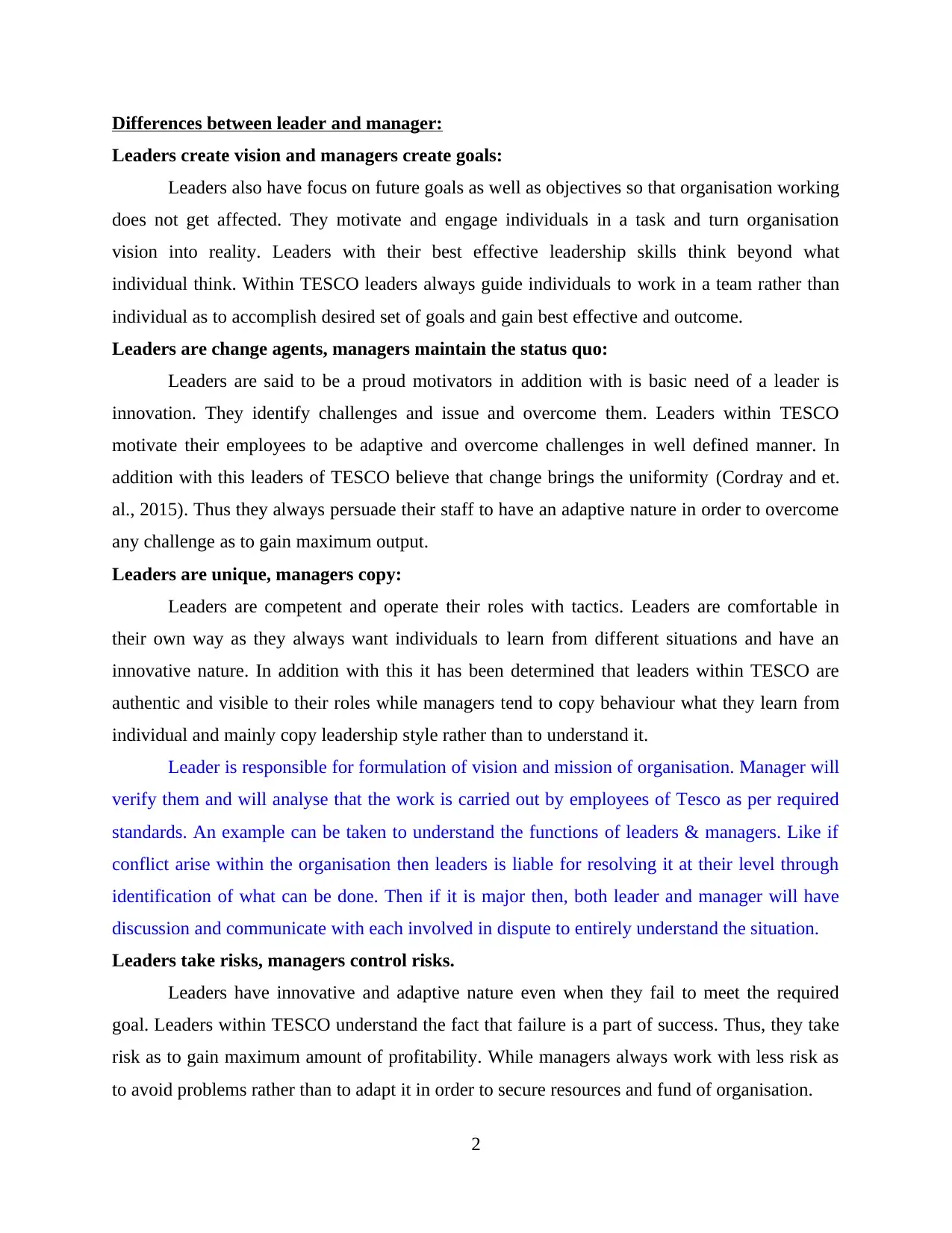
Differences between leader and manager:
Leaders create vision and managers create goals:
Leaders also have focus on future goals as well as objectives so that organisation working
does not get affected. They motivate and engage individuals in a task and turn organisation
vision into reality. Leaders with their best effective leadership skills think beyond what
individual think. Within TESCO leaders always guide individuals to work in a team rather than
individual as to accomplish desired set of goals and gain best effective and outcome.
Leaders are change agents, managers maintain the status quo:
Leaders are said to be a proud motivators in addition with is basic need of a leader is
innovation. They identify challenges and issue and overcome them. Leaders within TESCO
motivate their employees to be adaptive and overcome challenges in well defined manner. In
addition with this leaders of TESCO believe that change brings the uniformity (Cordray and et.
al., 2015). Thus they always persuade their staff to have an adaptive nature in order to overcome
any challenge as to gain maximum output.
Leaders are unique, managers copy:
Leaders are competent and operate their roles with tactics. Leaders are comfortable in
their own way as they always want individuals to learn from different situations and have an
innovative nature. In addition with this it has been determined that leaders within TESCO are
authentic and visible to their roles while managers tend to copy behaviour what they learn from
individual and mainly copy leadership style rather than to understand it.
Leader is responsible for formulation of vision and mission of organisation. Manager will
verify them and will analyse that the work is carried out by employees of Tesco as per required
standards. An example can be taken to understand the functions of leaders & managers. Like if
conflict arise within the organisation then leaders is liable for resolving it at their level through
identification of what can be done. Then if it is major then, both leader and manager will have
discussion and communicate with each involved in dispute to entirely understand the situation.
Leaders take risks, managers control risks.
Leaders have innovative and adaptive nature even when they fail to meet the required
goal. Leaders within TESCO understand the fact that failure is a part of success. Thus, they take
risk as to gain maximum amount of profitability. While managers always work with less risk as
to avoid problems rather than to adapt it in order to secure resources and fund of organisation.
2
Leaders create vision and managers create goals:
Leaders also have focus on future goals as well as objectives so that organisation working
does not get affected. They motivate and engage individuals in a task and turn organisation
vision into reality. Leaders with their best effective leadership skills think beyond what
individual think. Within TESCO leaders always guide individuals to work in a team rather than
individual as to accomplish desired set of goals and gain best effective and outcome.
Leaders are change agents, managers maintain the status quo:
Leaders are said to be a proud motivators in addition with is basic need of a leader is
innovation. They identify challenges and issue and overcome them. Leaders within TESCO
motivate their employees to be adaptive and overcome challenges in well defined manner. In
addition with this leaders of TESCO believe that change brings the uniformity (Cordray and et.
al., 2015). Thus they always persuade their staff to have an adaptive nature in order to overcome
any challenge as to gain maximum output.
Leaders are unique, managers copy:
Leaders are competent and operate their roles with tactics. Leaders are comfortable in
their own way as they always want individuals to learn from different situations and have an
innovative nature. In addition with this it has been determined that leaders within TESCO are
authentic and visible to their roles while managers tend to copy behaviour what they learn from
individual and mainly copy leadership style rather than to understand it.
Leader is responsible for formulation of vision and mission of organisation. Manager will
verify them and will analyse that the work is carried out by employees of Tesco as per required
standards. An example can be taken to understand the functions of leaders & managers. Like if
conflict arise within the organisation then leaders is liable for resolving it at their level through
identification of what can be done. Then if it is major then, both leader and manager will have
discussion and communicate with each involved in dispute to entirely understand the situation.
Leaders take risks, managers control risks.
Leaders have innovative and adaptive nature even when they fail to meet the required
goal. Leaders within TESCO understand the fact that failure is a part of success. Thus, they take
risk as to gain maximum amount of profitability. While managers always work with less risk as
to avoid problems rather than to adapt it in order to secure resources and fund of organisation.
2
Paraphrase This Document
Need a fresh take? Get an instant paraphrase of this document with our AI Paraphraser
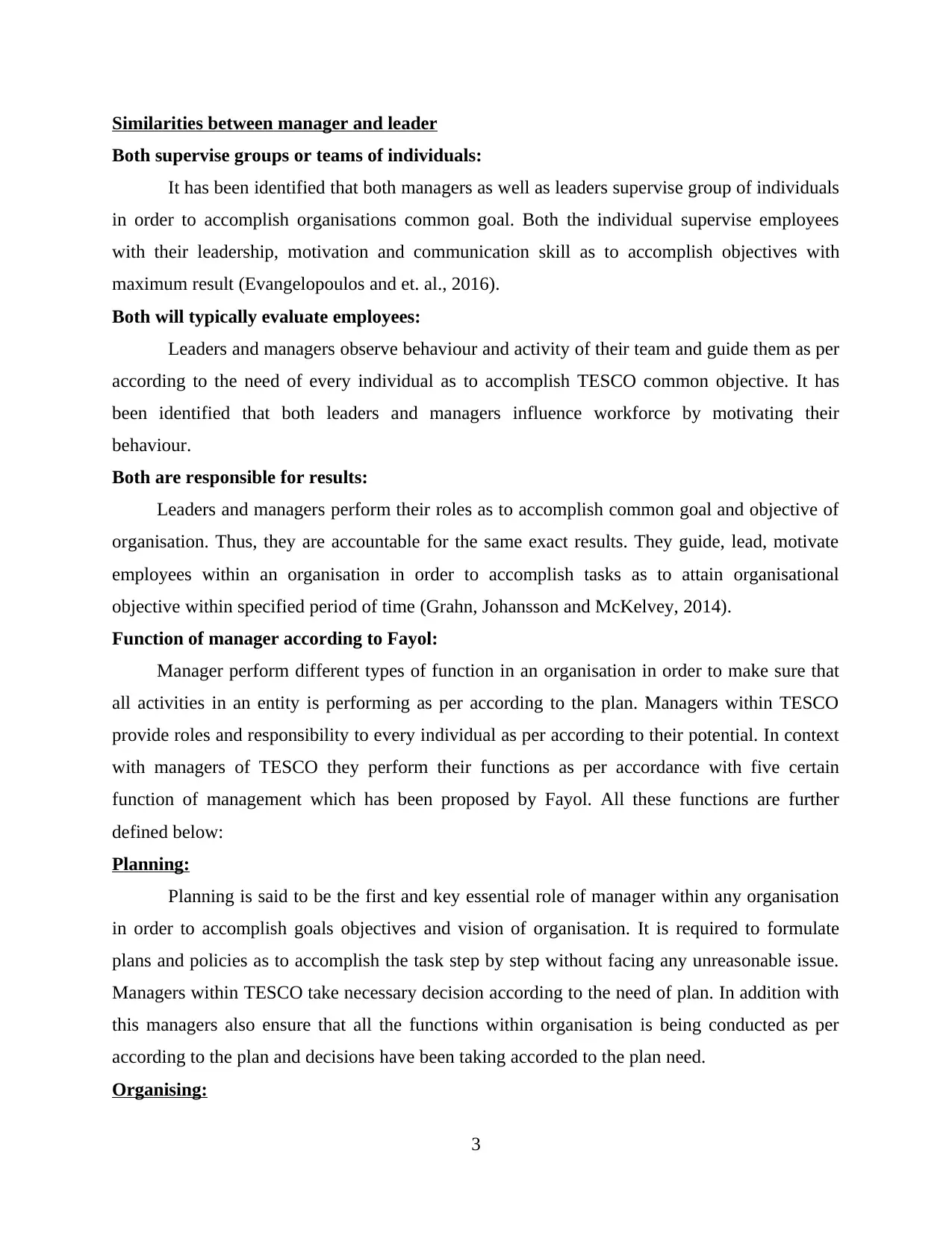
Similarities between manager and leader
Both supervise groups or teams of individuals:
It has been identified that both managers as well as leaders supervise group of individuals
in order to accomplish organisations common goal. Both the individual supervise employees
with their leadership, motivation and communication skill as to accomplish objectives with
maximum result (Evangelopoulos and et. al., 2016).
Both will typically evaluate employees:
Leaders and managers observe behaviour and activity of their team and guide them as per
according to the need of every individual as to accomplish TESCO common objective. It has
been identified that both leaders and managers influence workforce by motivating their
behaviour.
Both are responsible for results:
Leaders and managers perform their roles as to accomplish common goal and objective of
organisation. Thus, they are accountable for the same exact results. They guide, lead, motivate
employees within an organisation in order to accomplish tasks as to attain organisational
objective within specified period of time (Grahn, Johansson and McKelvey, 2014).
Function of manager according to Fayol:
Manager perform different types of function in an organisation in order to make sure that
all activities in an entity is performing as per according to the plan. Managers within TESCO
provide roles and responsibility to every individual as per according to their potential. In context
with managers of TESCO they perform their functions as per accordance with five certain
function of management which has been proposed by Fayol. All these functions are further
defined below:
Planning:
Planning is said to be the first and key essential role of manager within any organisation
in order to accomplish goals objectives and vision of organisation. It is required to formulate
plans and policies as to accomplish the task step by step without facing any unreasonable issue.
Managers within TESCO take necessary decision according to the need of plan. In addition with
this managers also ensure that all the functions within organisation is being conducted as per
according to the plan and decisions have been taking accorded to the plan need.
Organising:
3
Both supervise groups or teams of individuals:
It has been identified that both managers as well as leaders supervise group of individuals
in order to accomplish organisations common goal. Both the individual supervise employees
with their leadership, motivation and communication skill as to accomplish objectives with
maximum result (Evangelopoulos and et. al., 2016).
Both will typically evaluate employees:
Leaders and managers observe behaviour and activity of their team and guide them as per
according to the need of every individual as to accomplish TESCO common objective. It has
been identified that both leaders and managers influence workforce by motivating their
behaviour.
Both are responsible for results:
Leaders and managers perform their roles as to accomplish common goal and objective of
organisation. Thus, they are accountable for the same exact results. They guide, lead, motivate
employees within an organisation in order to accomplish tasks as to attain organisational
objective within specified period of time (Grahn, Johansson and McKelvey, 2014).
Function of manager according to Fayol:
Manager perform different types of function in an organisation in order to make sure that
all activities in an entity is performing as per according to the plan. Managers within TESCO
provide roles and responsibility to every individual as per according to their potential. In context
with managers of TESCO they perform their functions as per accordance with five certain
function of management which has been proposed by Fayol. All these functions are further
defined below:
Planning:
Planning is said to be the first and key essential role of manager within any organisation
in order to accomplish goals objectives and vision of organisation. It is required to formulate
plans and policies as to accomplish the task step by step without facing any unreasonable issue.
Managers within TESCO take necessary decision according to the need of plan. In addition with
this managers also ensure that all the functions within organisation is being conducted as per
according to the plan and decisions have been taking accorded to the plan need.
Organising:
3
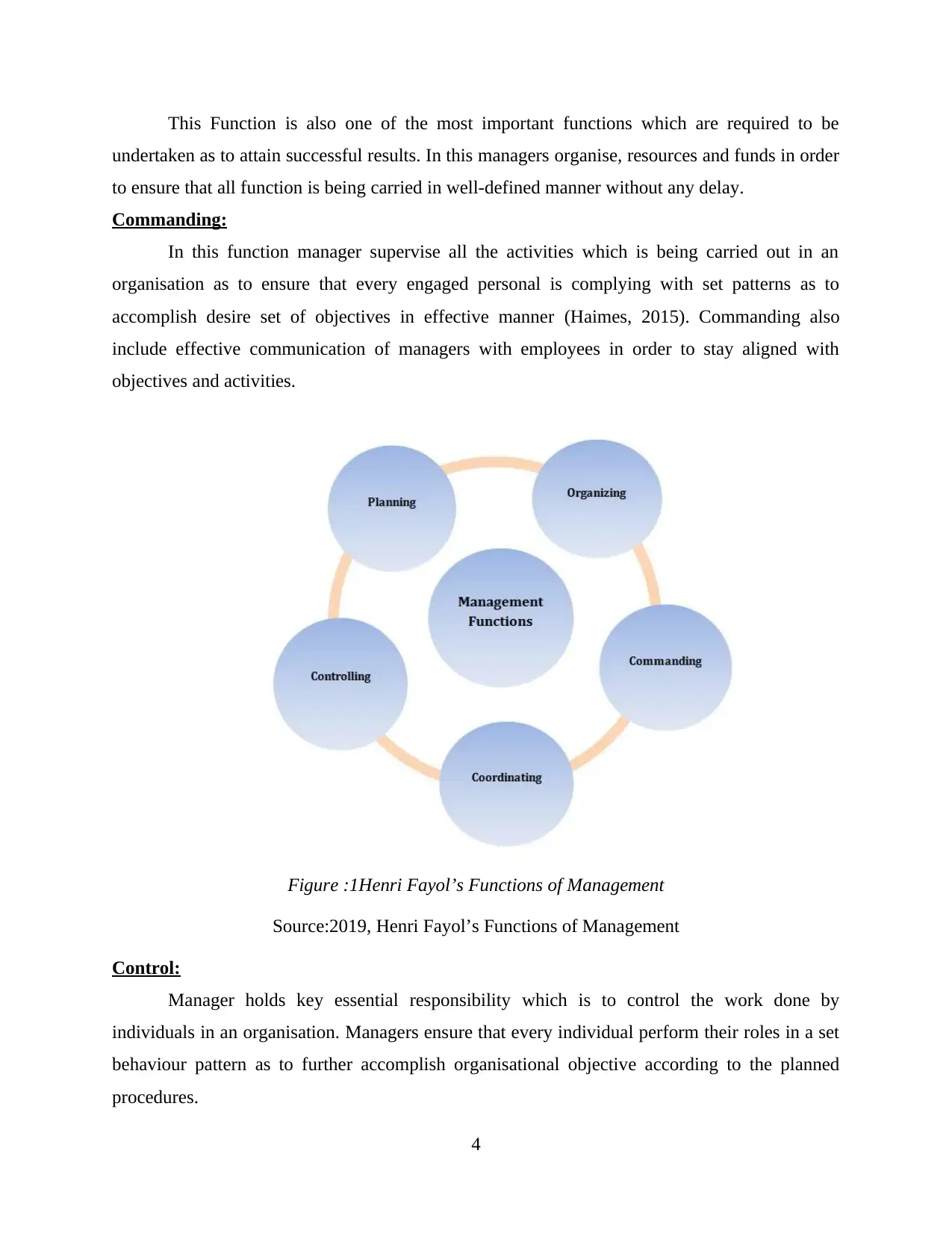
This Function is also one of the most important functions which are required to be
undertaken as to attain successful results. In this managers organise, resources and funds in order
to ensure that all function is being carried in well-defined manner without any delay.
Commanding:
In this function manager supervise all the activities which is being carried out in an
organisation as to ensure that every engaged personal is complying with set patterns as to
accomplish desire set of objectives in effective manner (Haimes, 2015). Commanding also
include effective communication of managers with employees in order to stay aligned with
objectives and activities.
Figure :1Henri Fayol’s Functions of Management
Source:2019, Henri Fayol’s Functions of Management
Control:
Manager holds key essential responsibility which is to control the work done by
individuals in an organisation. Managers ensure that every individual perform their roles in a set
behaviour pattern as to further accomplish organisational objective according to the planned
procedures.
4
undertaken as to attain successful results. In this managers organise, resources and funds in order
to ensure that all function is being carried in well-defined manner without any delay.
Commanding:
In this function manager supervise all the activities which is being carried out in an
organisation as to ensure that every engaged personal is complying with set patterns as to
accomplish desire set of objectives in effective manner (Haimes, 2015). Commanding also
include effective communication of managers with employees in order to stay aligned with
objectives and activities.
Figure :1Henri Fayol’s Functions of Management
Source:2019, Henri Fayol’s Functions of Management
Control:
Manager holds key essential responsibility which is to control the work done by
individuals in an organisation. Managers ensure that every individual perform their roles in a set
behaviour pattern as to further accomplish organisational objective according to the planned
procedures.
4
⊘ This is a preview!⊘
Do you want full access?
Subscribe today to unlock all pages.

Trusted by 1+ million students worldwide
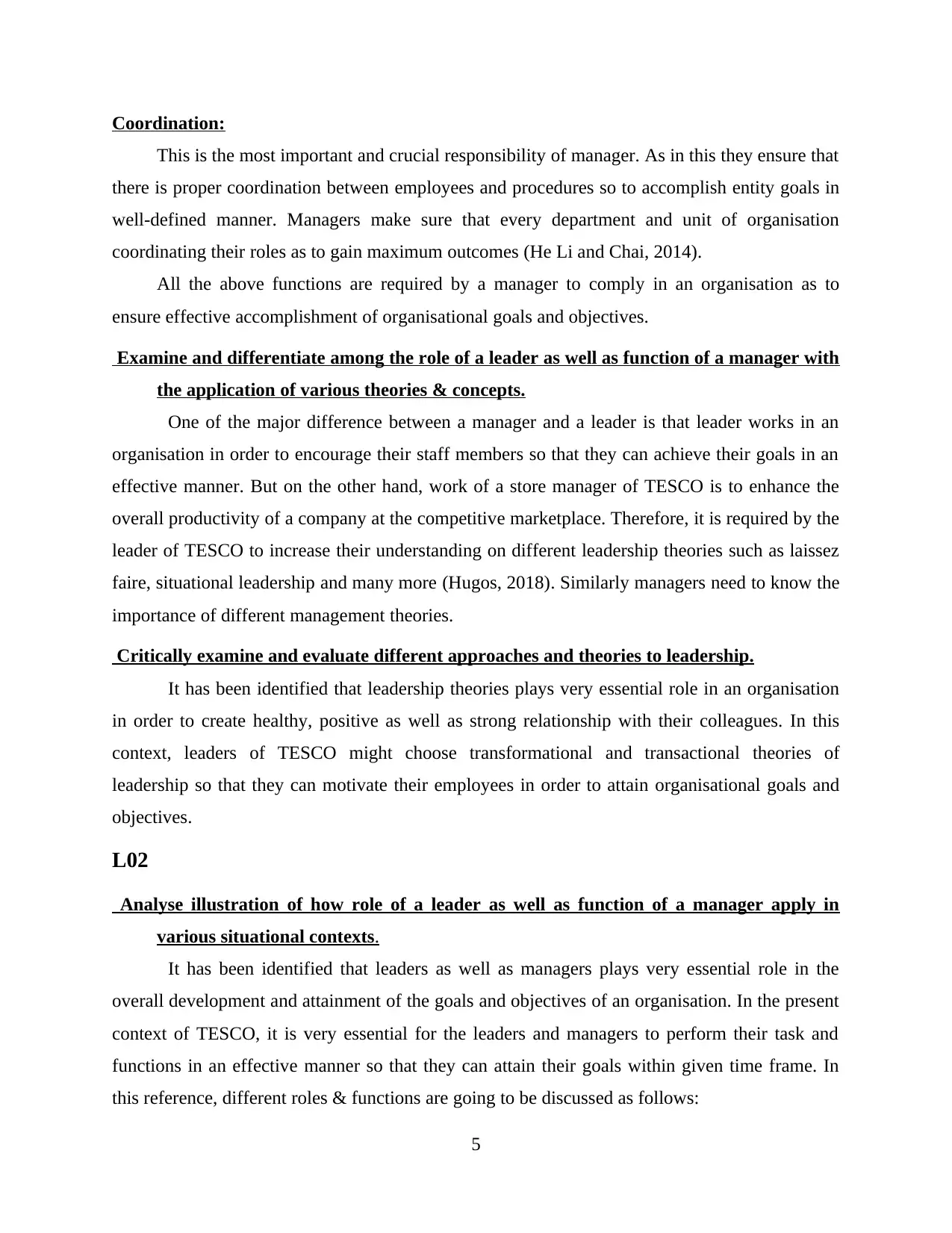
Coordination:
This is the most important and crucial responsibility of manager. As in this they ensure that
there is proper coordination between employees and procedures so to accomplish entity goals in
well-defined manner. Managers make sure that every department and unit of organisation
coordinating their roles as to gain maximum outcomes (He Li and Chai, 2014).
All the above functions are required by a manager to comply in an organisation as to
ensure effective accomplishment of organisational goals and objectives.
Examine and differentiate among the role of a leader as well as function of a manager with
the application of various theories & concepts.
One of the major difference between a manager and a leader is that leader works in an
organisation in order to encourage their staff members so that they can achieve their goals in an
effective manner. But on the other hand, work of a store manager of TESCO is to enhance the
overall productivity of a company at the competitive marketplace. Therefore, it is required by the
leader of TESCO to increase their understanding on different leadership theories such as laissez
faire, situational leadership and many more (Hugos, 2018). Similarly managers need to know the
importance of different management theories.
Critically examine and evaluate different approaches and theories to leadership.
It has been identified that leadership theories plays very essential role in an organisation
in order to create healthy, positive as well as strong relationship with their colleagues. In this
context, leaders of TESCO might choose transformational and transactional theories of
leadership so that they can motivate their employees in order to attain organisational goals and
objectives.
L02
Analyse illustration of how role of a leader as well as function of a manager apply in
various situational contexts.
It has been identified that leaders as well as managers plays very essential role in the
overall development and attainment of the goals and objectives of an organisation. In the present
context of TESCO, it is very essential for the leaders and managers to perform their task and
functions in an effective manner so that they can attain their goals within given time frame. In
this reference, different roles & functions are going to be discussed as follows:
5
This is the most important and crucial responsibility of manager. As in this they ensure that
there is proper coordination between employees and procedures so to accomplish entity goals in
well-defined manner. Managers make sure that every department and unit of organisation
coordinating their roles as to gain maximum outcomes (He Li and Chai, 2014).
All the above functions are required by a manager to comply in an organisation as to
ensure effective accomplishment of organisational goals and objectives.
Examine and differentiate among the role of a leader as well as function of a manager with
the application of various theories & concepts.
One of the major difference between a manager and a leader is that leader works in an
organisation in order to encourage their staff members so that they can achieve their goals in an
effective manner. But on the other hand, work of a store manager of TESCO is to enhance the
overall productivity of a company at the competitive marketplace. Therefore, it is required by the
leader of TESCO to increase their understanding on different leadership theories such as laissez
faire, situational leadership and many more (Hugos, 2018). Similarly managers need to know the
importance of different management theories.
Critically examine and evaluate different approaches and theories to leadership.
It has been identified that leadership theories plays very essential role in an organisation
in order to create healthy, positive as well as strong relationship with their colleagues. In this
context, leaders of TESCO might choose transformational and transactional theories of
leadership so that they can motivate their employees in order to attain organisational goals and
objectives.
L02
Analyse illustration of how role of a leader as well as function of a manager apply in
various situational contexts.
It has been identified that leaders as well as managers plays very essential role in the
overall development and attainment of the goals and objectives of an organisation. In the present
context of TESCO, it is very essential for the leaders and managers to perform their task and
functions in an effective manner so that they can attain their goals within given time frame. In
this reference, different roles & functions are going to be discussed as follows:
5
Paraphrase This Document
Need a fresh take? Get an instant paraphrase of this document with our AI Paraphraser
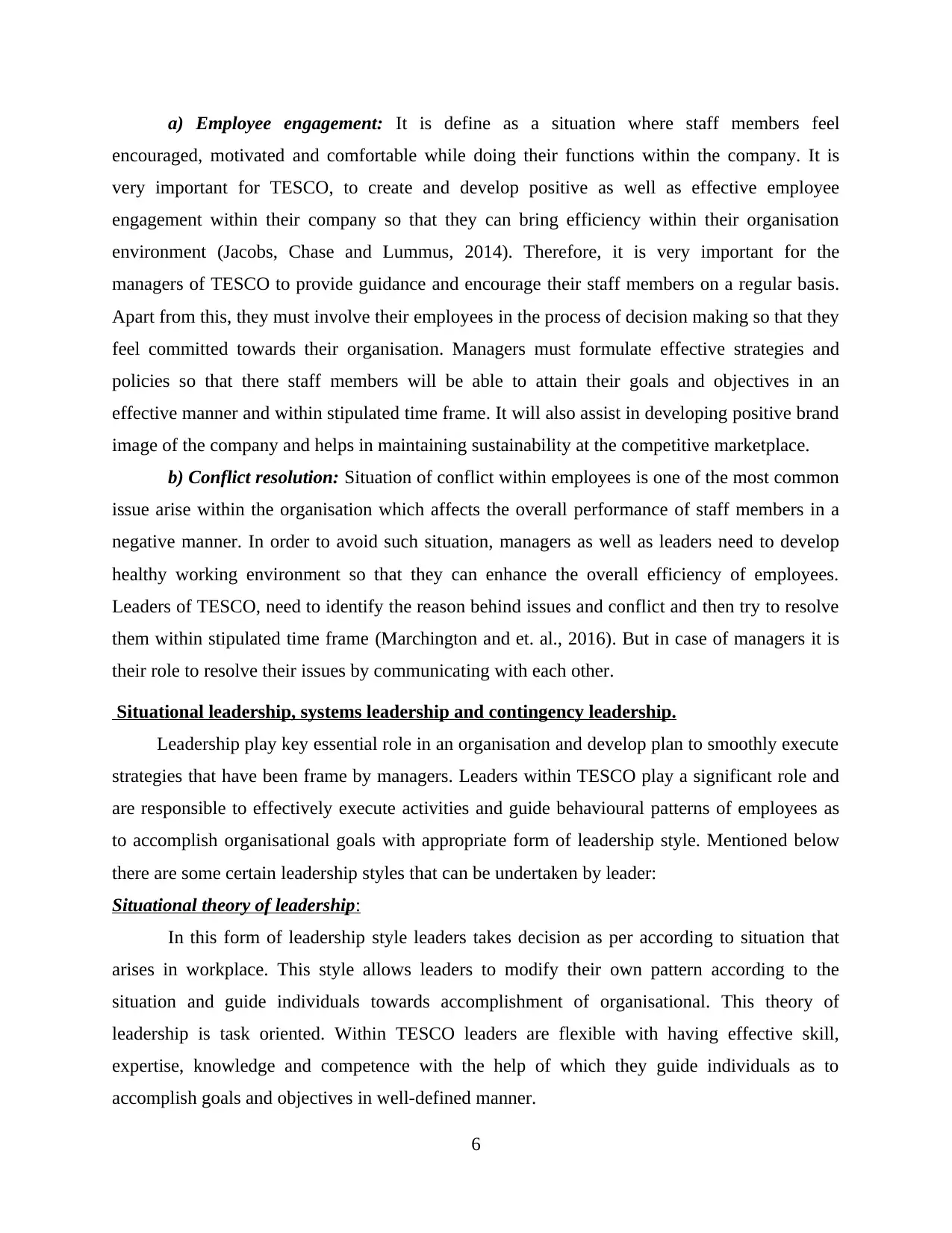
a) Employee engagement: It is define as a situation where staff members feel
encouraged, motivated and comfortable while doing their functions within the company. It is
very important for TESCO, to create and develop positive as well as effective employee
engagement within their company so that they can bring efficiency within their organisation
environment (Jacobs, Chase and Lummus, 2014). Therefore, it is very important for the
managers of TESCO to provide guidance and encourage their staff members on a regular basis.
Apart from this, they must involve their employees in the process of decision making so that they
feel committed towards their organisation. Managers must formulate effective strategies and
policies so that there staff members will be able to attain their goals and objectives in an
effective manner and within stipulated time frame. It will also assist in developing positive brand
image of the company and helps in maintaining sustainability at the competitive marketplace.
b) Conflict resolution: Situation of conflict within employees is one of the most common
issue arise within the organisation which affects the overall performance of staff members in a
negative manner. In order to avoid such situation, managers as well as leaders need to develop
healthy working environment so that they can enhance the overall efficiency of employees.
Leaders of TESCO, need to identify the reason behind issues and conflict and then try to resolve
them within stipulated time frame (Marchington and et. al., 2016). But in case of managers it is
their role to resolve their issues by communicating with each other.
Situational leadership, systems leadership and contingency leadership.
Leadership play key essential role in an organisation and develop plan to smoothly execute
strategies that have been frame by managers. Leaders within TESCO play a significant role and
are responsible to effectively execute activities and guide behavioural patterns of employees as
to accomplish organisational goals with appropriate form of leadership style. Mentioned below
there are some certain leadership styles that can be undertaken by leader:
Situational theory of leadership:
In this form of leadership style leaders takes decision as per according to situation that
arises in workplace. This style allows leaders to modify their own pattern according to the
situation and guide individuals towards accomplishment of organisational. This theory of
leadership is task oriented. Within TESCO leaders are flexible with having effective skill,
expertise, knowledge and competence with the help of which they guide individuals as to
accomplish goals and objectives in well-defined manner.
6
encouraged, motivated and comfortable while doing their functions within the company. It is
very important for TESCO, to create and develop positive as well as effective employee
engagement within their company so that they can bring efficiency within their organisation
environment (Jacobs, Chase and Lummus, 2014). Therefore, it is very important for the
managers of TESCO to provide guidance and encourage their staff members on a regular basis.
Apart from this, they must involve their employees in the process of decision making so that they
feel committed towards their organisation. Managers must formulate effective strategies and
policies so that there staff members will be able to attain their goals and objectives in an
effective manner and within stipulated time frame. It will also assist in developing positive brand
image of the company and helps in maintaining sustainability at the competitive marketplace.
b) Conflict resolution: Situation of conflict within employees is one of the most common
issue arise within the organisation which affects the overall performance of staff members in a
negative manner. In order to avoid such situation, managers as well as leaders need to develop
healthy working environment so that they can enhance the overall efficiency of employees.
Leaders of TESCO, need to identify the reason behind issues and conflict and then try to resolve
them within stipulated time frame (Marchington and et. al., 2016). But in case of managers it is
their role to resolve their issues by communicating with each other.
Situational leadership, systems leadership and contingency leadership.
Leadership play key essential role in an organisation and develop plan to smoothly execute
strategies that have been frame by managers. Leaders within TESCO play a significant role and
are responsible to effectively execute activities and guide behavioural patterns of employees as
to accomplish organisational goals with appropriate form of leadership style. Mentioned below
there are some certain leadership styles that can be undertaken by leader:
Situational theory of leadership:
In this form of leadership style leaders takes decision as per according to situation that
arises in workplace. This style allows leaders to modify their own pattern according to the
situation and guide individuals towards accomplishment of organisational. This theory of
leadership is task oriented. Within TESCO leaders are flexible with having effective skill,
expertise, knowledge and competence with the help of which they guide individuals as to
accomplish goals and objectives in well-defined manner.
6
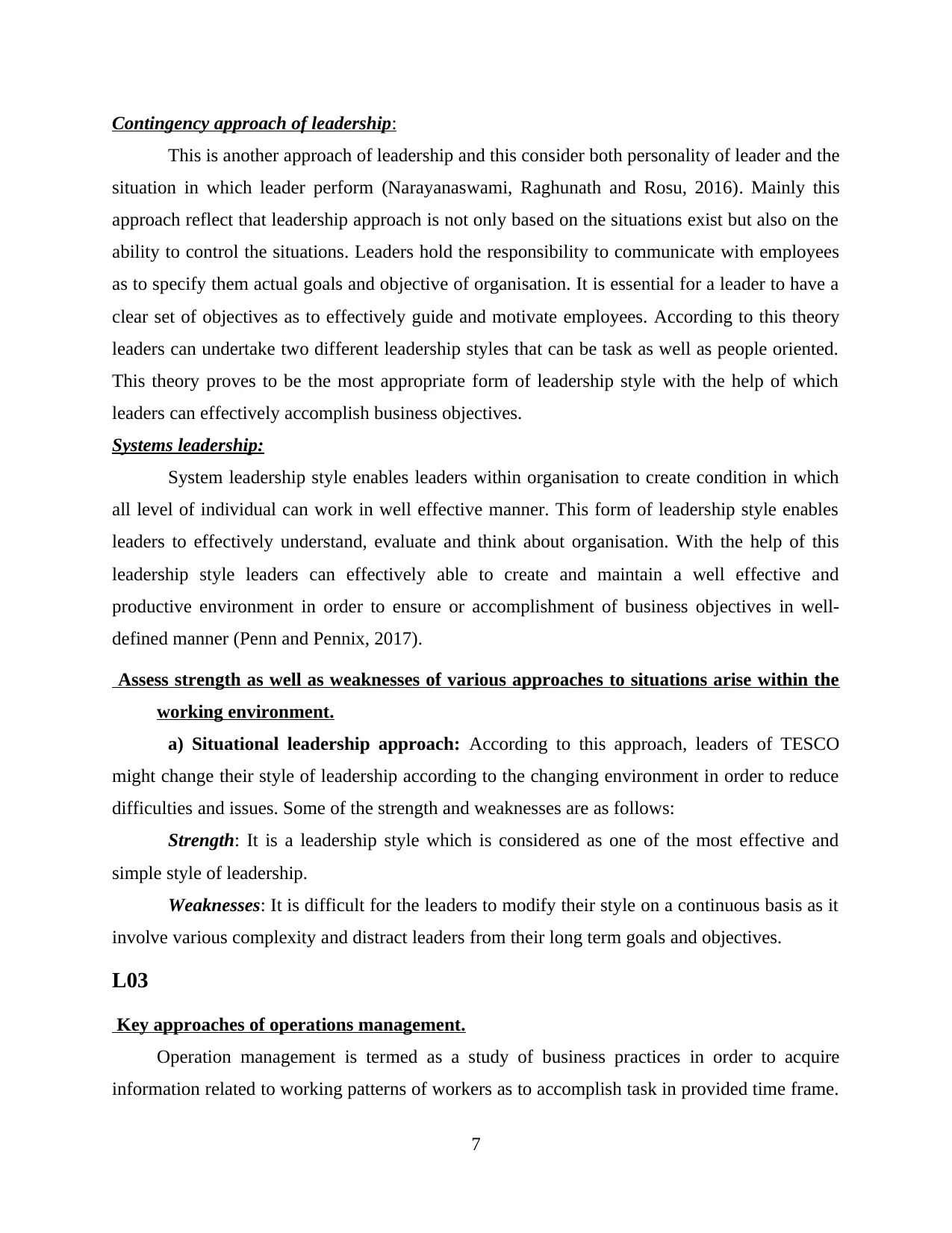
Contingency approach of leadership:
This is another approach of leadership and this consider both personality of leader and the
situation in which leader perform (Narayanaswami, Raghunath and Rosu, 2016). Mainly this
approach reflect that leadership approach is not only based on the situations exist but also on the
ability to control the situations. Leaders hold the responsibility to communicate with employees
as to specify them actual goals and objective of organisation. It is essential for a leader to have a
clear set of objectives as to effectively guide and motivate employees. According to this theory
leaders can undertake two different leadership styles that can be task as well as people oriented.
This theory proves to be the most appropriate form of leadership style with the help of which
leaders can effectively accomplish business objectives.
Systems leadership:
System leadership style enables leaders within organisation to create condition in which
all level of individual can work in well effective manner. This form of leadership style enables
leaders to effectively understand, evaluate and think about organisation. With the help of this
leadership style leaders can effectively able to create and maintain a well effective and
productive environment in order to ensure or accomplishment of business objectives in well-
defined manner (Penn and Pennix, 2017).
Assess strength as well as weaknesses of various approaches to situations arise within the
working environment.
a) Situational leadership approach: According to this approach, leaders of TESCO
might change their style of leadership according to the changing environment in order to reduce
difficulties and issues. Some of the strength and weaknesses are as follows:
Strength: It is a leadership style which is considered as one of the most effective and
simple style of leadership.
Weaknesses: It is difficult for the leaders to modify their style on a continuous basis as it
involve various complexity and distract leaders from their long term goals and objectives.
L03
Key approaches of operations management.
Operation management is termed as a study of business practices in order to acquire
information related to working patterns of workers as to accomplish task in provided time frame.
7
This is another approach of leadership and this consider both personality of leader and the
situation in which leader perform (Narayanaswami, Raghunath and Rosu, 2016). Mainly this
approach reflect that leadership approach is not only based on the situations exist but also on the
ability to control the situations. Leaders hold the responsibility to communicate with employees
as to specify them actual goals and objective of organisation. It is essential for a leader to have a
clear set of objectives as to effectively guide and motivate employees. According to this theory
leaders can undertake two different leadership styles that can be task as well as people oriented.
This theory proves to be the most appropriate form of leadership style with the help of which
leaders can effectively accomplish business objectives.
Systems leadership:
System leadership style enables leaders within organisation to create condition in which
all level of individual can work in well effective manner. This form of leadership style enables
leaders to effectively understand, evaluate and think about organisation. With the help of this
leadership style leaders can effectively able to create and maintain a well effective and
productive environment in order to ensure or accomplishment of business objectives in well-
defined manner (Penn and Pennix, 2017).
Assess strength as well as weaknesses of various approaches to situations arise within the
working environment.
a) Situational leadership approach: According to this approach, leaders of TESCO
might change their style of leadership according to the changing environment in order to reduce
difficulties and issues. Some of the strength and weaknesses are as follows:
Strength: It is a leadership style which is considered as one of the most effective and
simple style of leadership.
Weaknesses: It is difficult for the leaders to modify their style on a continuous basis as it
involve various complexity and distract leaders from their long term goals and objectives.
L03
Key approaches of operations management.
Operation management is termed as a study of business practices in order to acquire
information related to working patterns of workers as to accomplish task in provided time frame.
7
⊘ This is a preview!⊘
Do you want full access?
Subscribe today to unlock all pages.

Trusted by 1+ million students worldwide
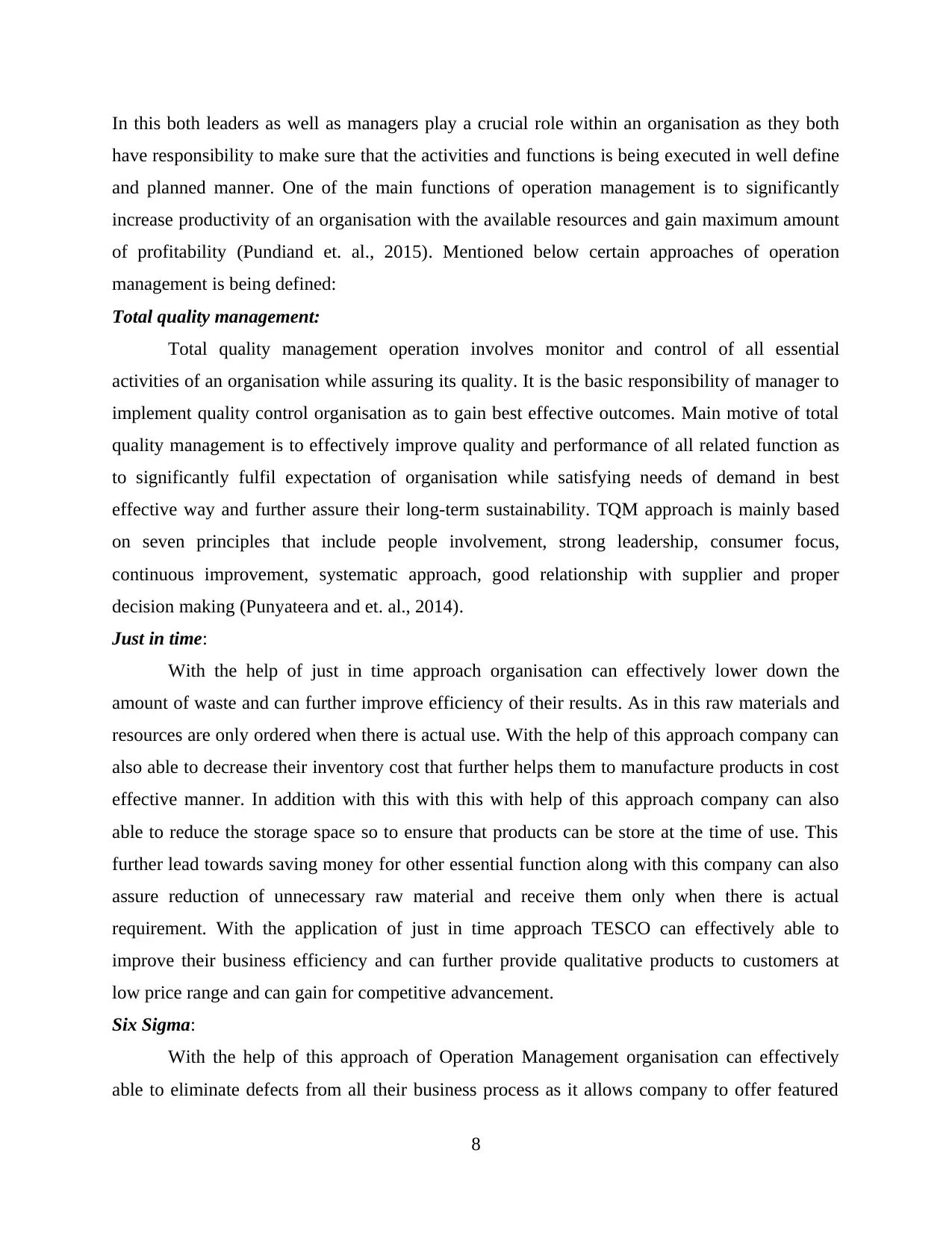
In this both leaders as well as managers play a crucial role within an organisation as they both
have responsibility to make sure that the activities and functions is being executed in well define
and planned manner. One of the main functions of operation management is to significantly
increase productivity of an organisation with the available resources and gain maximum amount
of profitability (Pundiand et. al., 2015). Mentioned below certain approaches of operation
management is being defined:
Total quality management:
Total quality management operation involves monitor and control of all essential
activities of an organisation while assuring its quality. It is the basic responsibility of manager to
implement quality control organisation as to gain best effective outcomes. Main motive of total
quality management is to effectively improve quality and performance of all related function as
to significantly fulfil expectation of organisation while satisfying needs of demand in best
effective way and further assure their long-term sustainability. TQM approach is mainly based
on seven principles that include people involvement, strong leadership, consumer focus,
continuous improvement, systematic approach, good relationship with supplier and proper
decision making (Punyateera and et. al., 2014).
Just in time:
With the help of just in time approach organisation can effectively lower down the
amount of waste and can further improve efficiency of their results. As in this raw materials and
resources are only ordered when there is actual use. With the help of this approach company can
also able to decrease their inventory cost that further helps them to manufacture products in cost
effective manner. In addition with this with this with help of this approach company can also
able to reduce the storage space so to ensure that products can be store at the time of use. This
further lead towards saving money for other essential function along with this company can also
assure reduction of unnecessary raw material and receive them only when there is actual
requirement. With the application of just in time approach TESCO can effectively able to
improve their business efficiency and can further provide qualitative products to customers at
low price range and can gain for competitive advancement.
Six Sigma:
With the help of this approach of Operation Management organisation can effectively
able to eliminate defects from all their business process as it allows company to offer featured
8
have responsibility to make sure that the activities and functions is being executed in well define
and planned manner. One of the main functions of operation management is to significantly
increase productivity of an organisation with the available resources and gain maximum amount
of profitability (Pundiand et. al., 2015). Mentioned below certain approaches of operation
management is being defined:
Total quality management:
Total quality management operation involves monitor and control of all essential
activities of an organisation while assuring its quality. It is the basic responsibility of manager to
implement quality control organisation as to gain best effective outcomes. Main motive of total
quality management is to effectively improve quality and performance of all related function as
to significantly fulfil expectation of organisation while satisfying needs of demand in best
effective way and further assure their long-term sustainability. TQM approach is mainly based
on seven principles that include people involvement, strong leadership, consumer focus,
continuous improvement, systematic approach, good relationship with supplier and proper
decision making (Punyateera and et. al., 2014).
Just in time:
With the help of just in time approach organisation can effectively lower down the
amount of waste and can further improve efficiency of their results. As in this raw materials and
resources are only ordered when there is actual use. With the help of this approach company can
also able to decrease their inventory cost that further helps them to manufacture products in cost
effective manner. In addition with this with this with help of this approach company can also
able to reduce the storage space so to ensure that products can be store at the time of use. This
further lead towards saving money for other essential function along with this company can also
assure reduction of unnecessary raw material and receive them only when there is actual
requirement. With the application of just in time approach TESCO can effectively able to
improve their business efficiency and can further provide qualitative products to customers at
low price range and can gain for competitive advancement.
Six Sigma:
With the help of this approach of Operation Management organisation can effectively
able to eliminate defects from all their business process as it allows company to offer featured
8
Paraphrase This Document
Need a fresh take? Get an instant paraphrase of this document with our AI Paraphraser
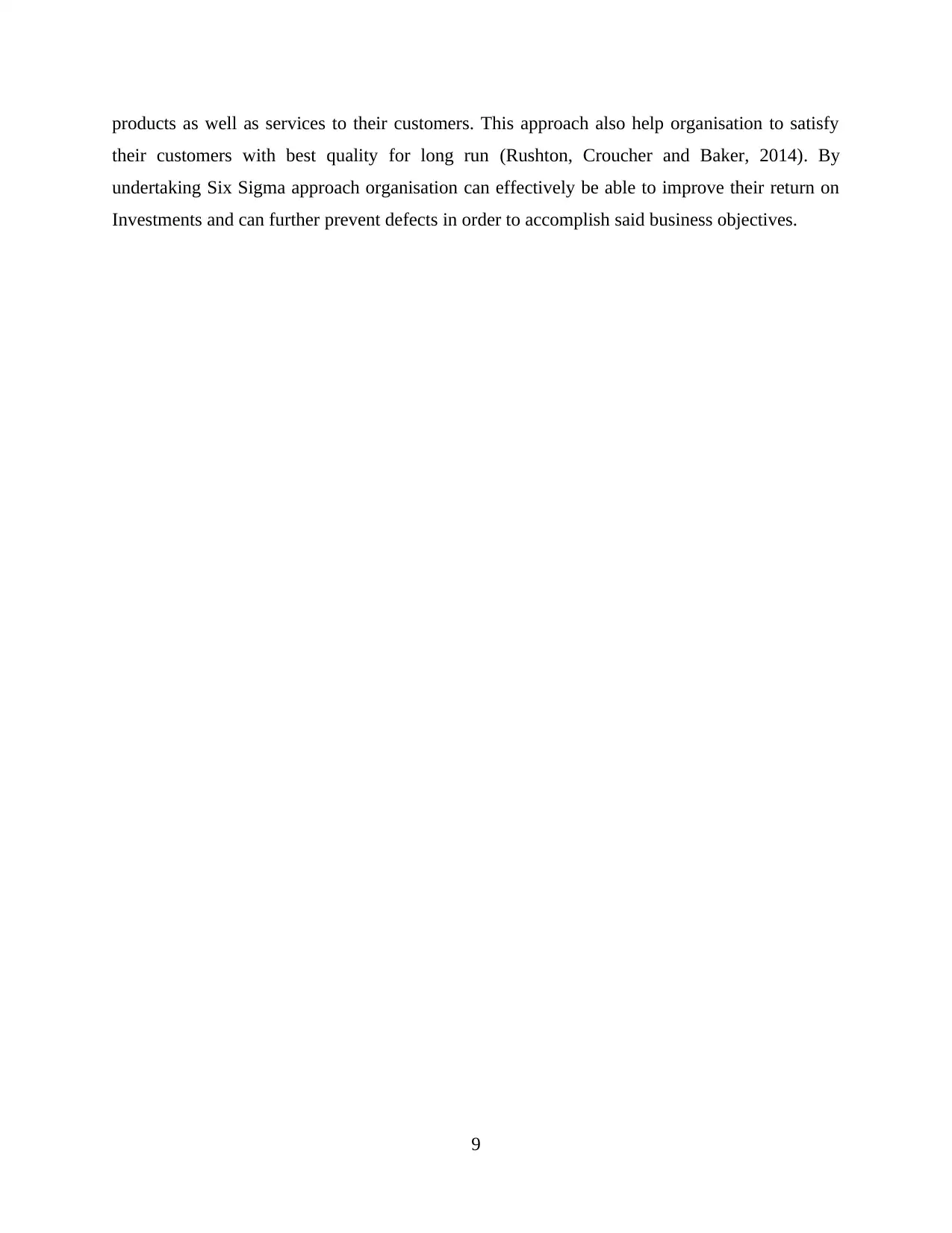
products as well as services to their customers. This approach also help organisation to satisfy
their customers with best quality for long run (Rushton, Croucher and Baker, 2014). By
undertaking Six Sigma approach organisation can effectively be able to improve their return on
Investments and can further prevent defects in order to accomplish said business objectives.
9
their customers with best quality for long run (Rushton, Croucher and Baker, 2014). By
undertaking Six Sigma approach organisation can effectively be able to improve their return on
Investments and can further prevent defects in order to accomplish said business objectives.
9
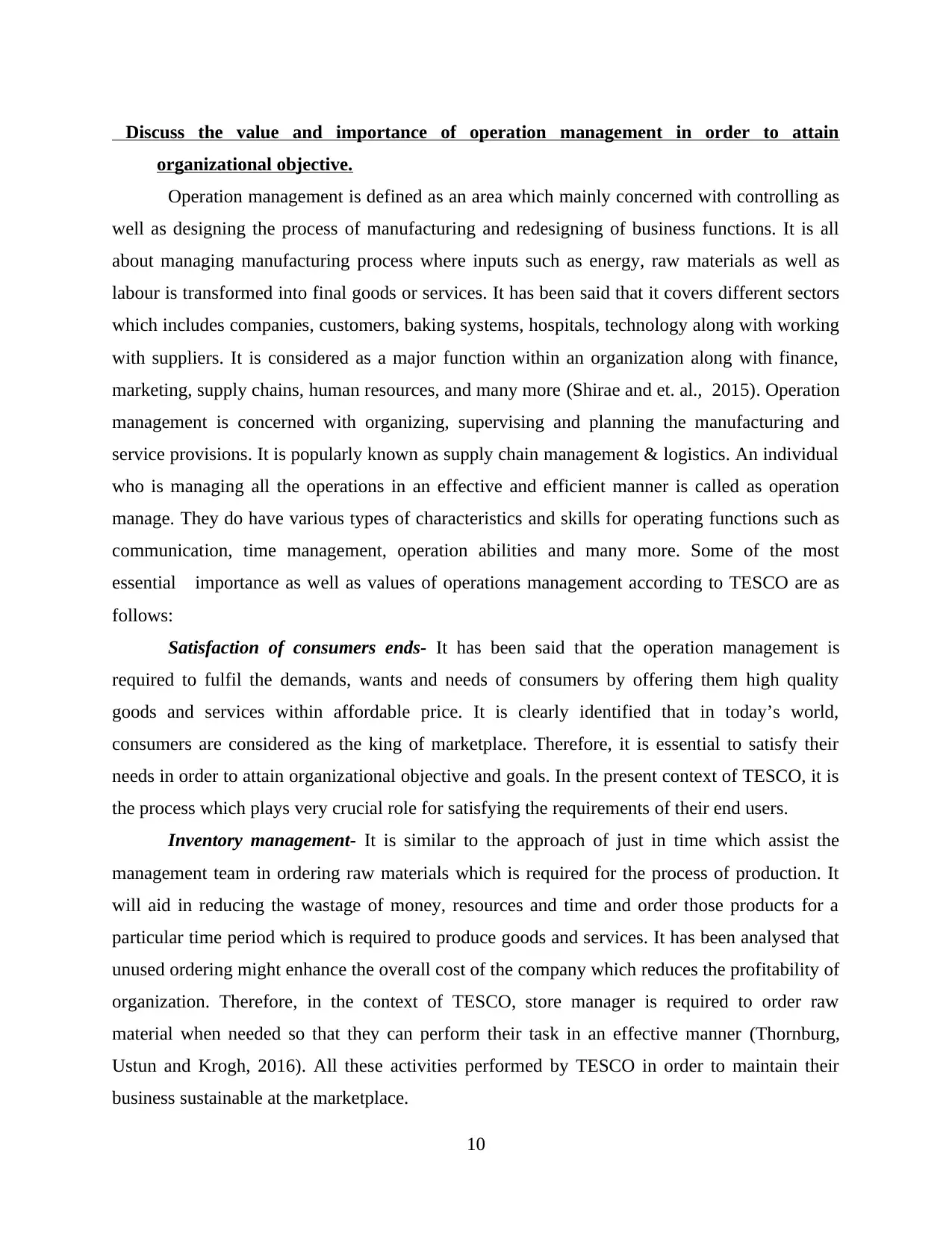
Discuss the value and importance of operation management in order to attain
organizational objective.
Operation management is defined as an area which mainly concerned with controlling as
well as designing the process of manufacturing and redesigning of business functions. It is all
about managing manufacturing process where inputs such as energy, raw materials as well as
labour is transformed into final goods or services. It has been said that it covers different sectors
which includes companies, customers, baking systems, hospitals, technology along with working
with suppliers. It is considered as a major function within an organization along with finance,
marketing, supply chains, human resources, and many more (Shirae and et. al., 2015). Operation
management is concerned with organizing, supervising and planning the manufacturing and
service provisions. It is popularly known as supply chain management & logistics. An individual
who is managing all the operations in an effective and efficient manner is called as operation
manage. They do have various types of characteristics and skills for operating functions such as
communication, time management, operation abilities and many more. Some of the most
essential importance as well as values of operations management according to TESCO are as
follows:
Satisfaction of consumers ends- It has been said that the operation management is
required to fulfil the demands, wants and needs of consumers by offering them high quality
goods and services within affordable price. It is clearly identified that in today’s world,
consumers are considered as the king of marketplace. Therefore, it is essential to satisfy their
needs in order to attain organizational objective and goals. In the present context of TESCO, it is
the process which plays very crucial role for satisfying the requirements of their end users.
Inventory management- It is similar to the approach of just in time which assist the
management team in ordering raw materials which is required for the process of production. It
will aid in reducing the wastage of money, resources and time and order those products for a
particular time period which is required to produce goods and services. It has been analysed that
unused ordering might enhance the overall cost of the company which reduces the profitability of
organization. Therefore, in the context of TESCO, store manager is required to order raw
material when needed so that they can perform their task in an effective manner (Thornburg,
Ustun and Krogh, 2016). All these activities performed by TESCO in order to maintain their
business sustainable at the marketplace.
10
organizational objective.
Operation management is defined as an area which mainly concerned with controlling as
well as designing the process of manufacturing and redesigning of business functions. It is all
about managing manufacturing process where inputs such as energy, raw materials as well as
labour is transformed into final goods or services. It has been said that it covers different sectors
which includes companies, customers, baking systems, hospitals, technology along with working
with suppliers. It is considered as a major function within an organization along with finance,
marketing, supply chains, human resources, and many more (Shirae and et. al., 2015). Operation
management is concerned with organizing, supervising and planning the manufacturing and
service provisions. It is popularly known as supply chain management & logistics. An individual
who is managing all the operations in an effective and efficient manner is called as operation
manage. They do have various types of characteristics and skills for operating functions such as
communication, time management, operation abilities and many more. Some of the most
essential importance as well as values of operations management according to TESCO are as
follows:
Satisfaction of consumers ends- It has been said that the operation management is
required to fulfil the demands, wants and needs of consumers by offering them high quality
goods and services within affordable price. It is clearly identified that in today’s world,
consumers are considered as the king of marketplace. Therefore, it is essential to satisfy their
needs in order to attain organizational objective and goals. In the present context of TESCO, it is
the process which plays very crucial role for satisfying the requirements of their end users.
Inventory management- It is similar to the approach of just in time which assist the
management team in ordering raw materials which is required for the process of production. It
will aid in reducing the wastage of money, resources and time and order those products for a
particular time period which is required to produce goods and services. It has been analysed that
unused ordering might enhance the overall cost of the company which reduces the profitability of
organization. Therefore, in the context of TESCO, store manager is required to order raw
material when needed so that they can perform their task in an effective manner (Thornburg,
Ustun and Krogh, 2016). All these activities performed by TESCO in order to maintain their
business sustainable at the marketplace.
10
⊘ This is a preview!⊘
Do you want full access?
Subscribe today to unlock all pages.

Trusted by 1+ million students worldwide
1 out of 16
Related Documents
Your All-in-One AI-Powered Toolkit for Academic Success.
+13062052269
info@desklib.com
Available 24*7 on WhatsApp / Email
![[object Object]](/_next/static/media/star-bottom.7253800d.svg)
Unlock your academic potential
Copyright © 2020–2026 A2Z Services. All Rights Reserved. Developed and managed by ZUCOL.





